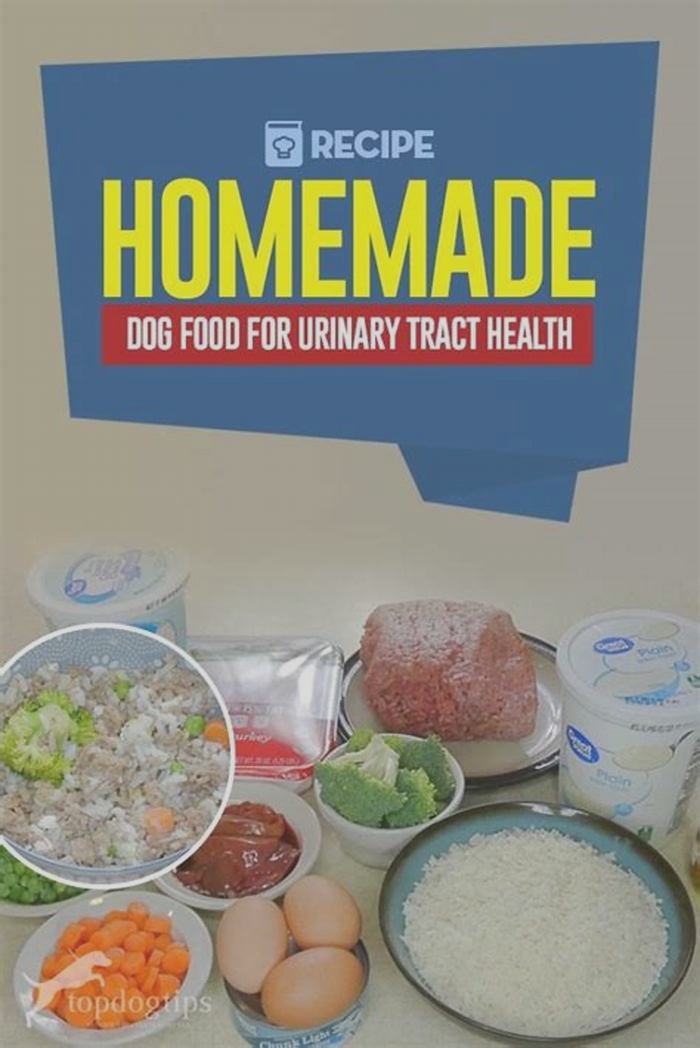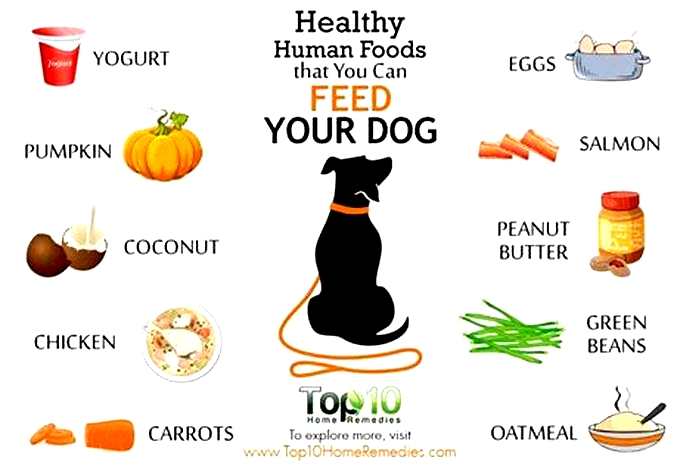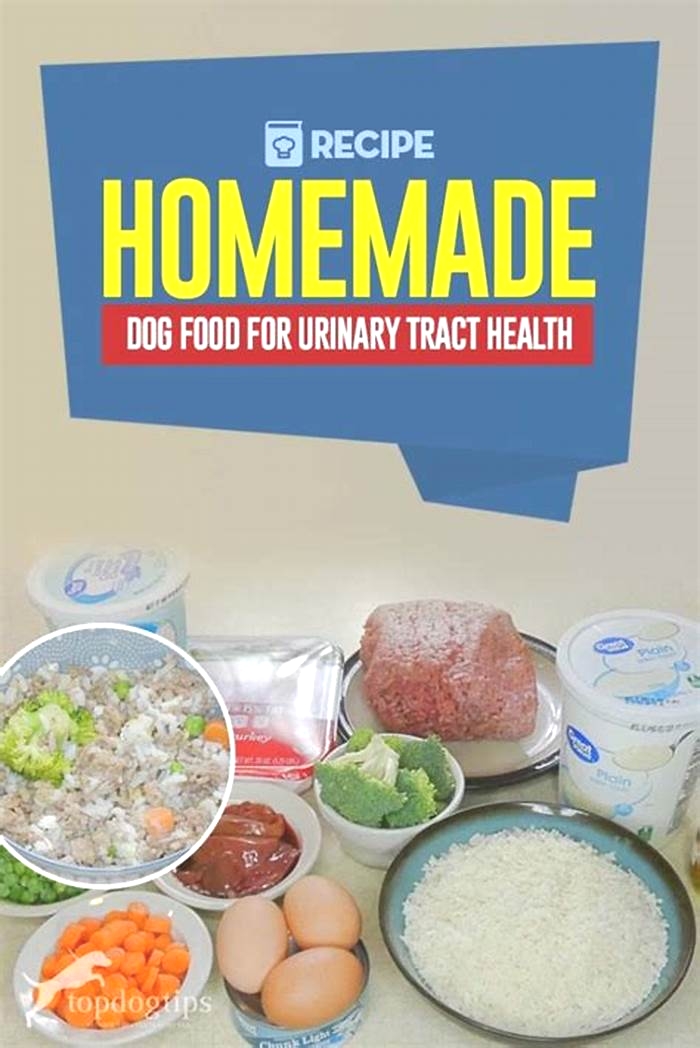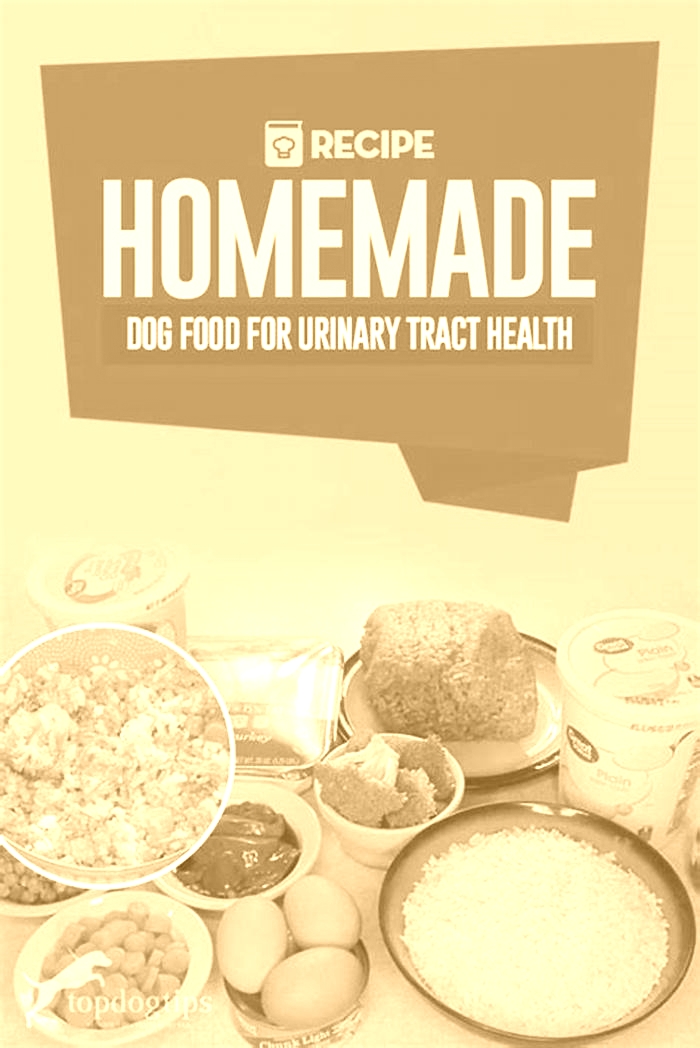homemade dog food urinary health
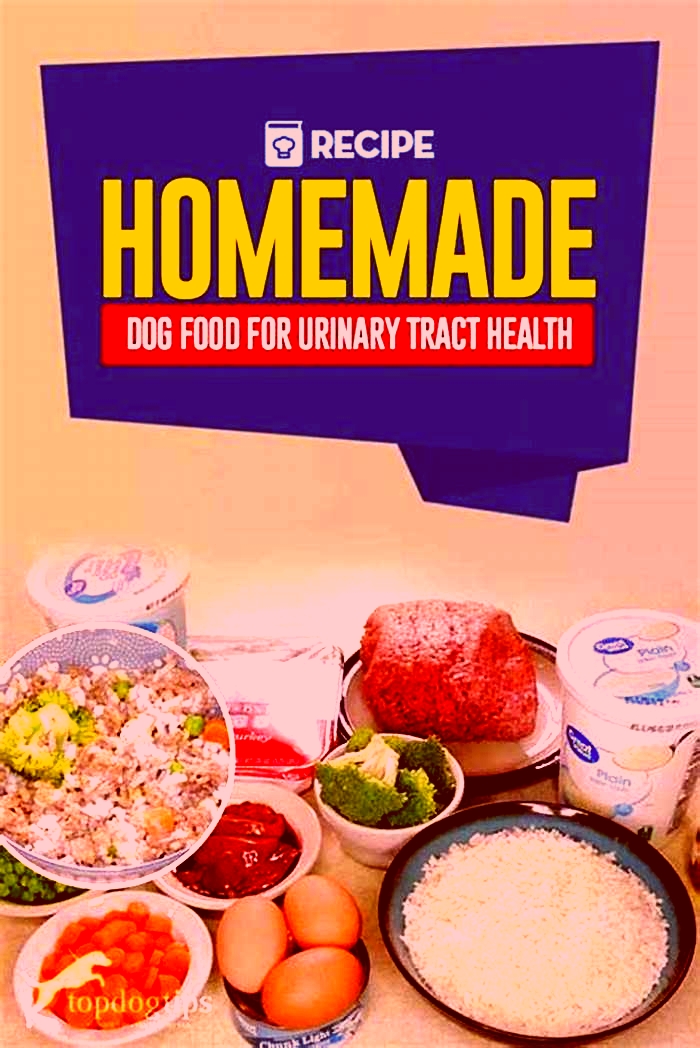
Homemade dog food recipe for urinary health
Welcome tomy comprehensive guide for a homemade, natural dog food recipe specifically designed to support your furry friend's urinary tract health. Providing your beloved pet with the right nutrition can significantly improve urinary health and prevent common conditions like urinary tract infections (UTIs) or stones. We'll delve into the advantages of a tailored diet, crucial ingredients that promote urinary wellness, and the perfect steps to prepare this home-cooked feast. This article is the ultimate resource for pet parents seeking to enhance their dogs' urinary health naturally and effectively, filled with expert advice, practical tips, and scientifically-backed knowledge on canine urinary care (research referenced).
Follow the steps to create the perfect homemade diet for your dog
Step 1 Read the general rules for support Urinary Health, and implement them!
Step 2 Learn how to support your dogs specific Urinary issue
Step 3 Adjust the Urinary Support recipe (as shown in video below) orpurchase the Urinary Support Plan for my health plan plus email support from me.
General Rules for canine urinary support
What is the urinary tract?
The urinary tract is a waste removal system. When your dog eats, the body takes nutrients from the food and it goes into the blood. Not everything taken into the blood is needed or in fact healthy, its waste. The kidneys and urinary system help the body to eliminate the waste.
All of the waste thats carried in the bloodstream (after entering the blood through the digestive process) gets to the kidneys, where it is removed along with water and other waste.
However, if the diet is imbalance or the urinary tract is not functioning optimally, due to bacterial imbalance or a genetic predisposition, waste can accumulate and cause infection and/ or urinary crystals and stones.
Appropriately Balanced Fresh Food
Creating a balanced fresh food diet will reduce the risk of infection and stone formation, as imbalance reduces urinary tract function. A good way to think about it, is that bacteria, fungus and other microorganisms feed off the food you feed your dog, and if you provide too much of the wrong food, it feeds the bad bacteria more than the good.
Urine infections affect around 27% of dogs. These are infections that cause inflammation in the urinary tract and are mainly an overgrowth of bacteria, but they can also be caused by fungus overgrowth, and in extremely rare cases, viral infection. (1)
Removing inflammatory ingredients like gluten (pasta, bread, corn, wheat, rice, maize etc.) is imperative. Check the treats you feed your dog to ensure these ingredients arent being made available.
You must also remove any intolerances from your dogs diet, these are proteins (meats) that they dont digest as well. Signs of poor protein digestion include ear infections, itchiness, paw licking and regular lose stools.
Gut and Urine Microbiome Support
A diverse, balanced and healthy microbiome, both in the gut and the urine, comes from having a range of natural fresh foods in the diet (2).
The bacterial urinary microbiome in healthy state has a greater taxonomic richness, meaning having a balance gut microbiome is a clear indicator of health. (3)
Support comes from the balance fresh food, and also the use of probiotics like natural organic yoghurt, kefir, goats milk or sauerkraut. Use these at least 2-3 times per week.
Increase urine supersaturation (less concentrated urine)
Many urinary stones formation, like calcium oxalate, cystine and urate stones, are affected by the concentration of the urine. (4,5,6)
Increasing the moisture in your dogs diet, by adding water to their meals (25ml per 100g) can help.
I recommend also feeding bone broth, 25ml per 10kg/ 20lbs of body weight up to FOUR times per week.
Specific Canine Urinary Support
Using the Urinary Support recipe on YouTube and the information provided on the specific issue, amend it to suit your dogs needs.
Urinary Tract Infection Support for dogs
Generally UTIs are caused by inappropriate diets (not the best ingredients, and too many carbs) causing an alkaline urine. A healthy dog produces slightly acidic urine between 6.0-6.5 pH. There is a correlation between bacterial overgrowth with more neutral urine, around pH 7. (7)
You want to increase the acidity, which will come from using my recipes naturally, but use apples and cranberries regularly to help this. Do not use carbs for the first 2 weeks.
The overuse of antibiotics can also cause more regular UTIs, you need to minimise their use as much as possible. Legally Im obliged to say consult your Vet, but try diet and every other option before using antibiotics. The more they are used, the more regularly your dog will get an infection. (8)
Homemade dog food for Calcium Oxalate Stones
Calcium homeostasis is a major cause of calcium oxalate stones. To provide a correct balance of calcium, you need ensure sufficient phosphorus and Vitamin D. (4)Do not remove calcium from the diet. Use the recipe provided, and make liver and ideally fish too, are also given on a regular basis.
Remember to increase the water intake of your dogs diet too (follow the general rules for Canine Urinary Tract Health).
Homemade dog food for Cystine Stones
There is little evidence to support dietary restriction of protein, however the restriction of methionine contain foods like broccoli, mushrooms, cauliflower, potatos is recommended. Also the vegetables used should have a high in organic anion content (9)
Dietary management of cystine stones is designed around maintaining a urine pH 6.5 - 6.75. This is done by having a slightly more alkaline diet than is normally prescribed for a dog. This can be hard, and dont lose too much sleep over this, as following the general rules for Canine Urinary tract health play a more effective role in managing the issue. Avoid apple, broccoli, mushrooms, cauliflower and potatoes. Use squash if using carbs.
You need to restrict salt intake. No more snacking on leftovers that have human levels of salt.
The inclusion of Alpha Lipoic Acid (flaxseed oil as the oil you use) is a safe and well tolerated food supplement that has been remarkably effective in a mouse model of cystinuria. (10)
If stones are present, or you think your dog is beginning to struggle to pee, an initial high alkaline diet with the inclusion of potassium citrate is recommended to increase the speed in which the stones dissolve (11).
Urate Stones
Many cases of urate stones come from Dalmatian dogs, as all pure-bred Dalmatians excrete excessive quantities of uric acid (and therefore have two abnormal copies of the gene).
Generally this only affects male Dalmatian, due to the width of their urinary tract veign slightly less wide. However, dogs with a history of stones must only consume low fat meats; lean beef, cod, venison and rabbit.
Much is made of low purine diets being affective, I have only seen one study funded by Royal Canin (Mars), so it should most certainly be taken with a pinch of salt (do not add to your dogs diet).
To reduce purines effectively, organ meat should be liver or heart from beef, chicken or lamb. Organ meat should only make up 5% of the diet for sensitive dogs and 10% for healthy dogs (Ideally chicken liver or lamb liver or heart)
Using small amount (10-15%) of grated low purine vegetables is generally great for all breeds with a purine metabolism problem. (Avoid higher purine veggie, check here).
Additional Support for dogs with Urinary Tract Issues
If you want specific recipes or help with your dogs diet, please sign up for a consultation, or the Urinary Support Plan which comes with specific recipes to each issue.
References:
- https://todaysveterinarypractice.com/urinary-tract-infections-in-dogs/
- Rodrguez, F.M., Rubio, L.S., Nanne, I.G., Martn, F.S., Emiliani, E. and Feu, O.A., 2020. The relationship between calcium oxalate lithiasis and chronic proinflammatory intestinal dysbiosis pattern: a prospective study.Urolithiasis,48(4), pp.321-328.
- Melgarejo, T., Oakley, B.B., Krumbeck, J.A., Tang, S., Krantz, A. and Linde, A., 2021. Assessment of bacterial and fungal populations in urine from clinically healthy dogs using nextgeneration sequencing.Journal of veterinary internal medicine,35(3), pp.1416-1426.
- Hunprasit, V., 2017. Epidemiologic Evaluation of Risk Factors for Calcium Oxalate Urolith Formation and Recurrence in Dogs
- Stevenson, A.E., Blackburn, J.M., Markwell, P.J. and Robertson, W.G., 2004. Nutrient intake and urine composition in calcium oxalate stone-forming dogs: comparison with healthy dogs and impact of dietary modification.Veterinary therapeutics: research in applied veterinary medicine,5(3), pp.218-231.
- Bartges, J.W. and Callens, A.J., 2015. Urolithiasis.Veterinary Clinics: Small Animal Practice,45(4), pp.747-768.
- Robin R. Shields-Cutler, Jan R. Crowley, Chia S. Hung, Ann E. Stapleton, Courtney C. Aldrich, Jonas Marschall, Jeffrey P. Henderson.Human Urinary Composition Controls Siderocalin's Antibacterial Activity.Journal of Biological Chemistry, 2015; jbc.M115.645812 DOI:10.1074/jbc.M115.645812
- Werner, M., Suchodolski, J.S., Straubinger, R.K., Wolf, G., Steiner, J.M., Lidbury, J.A., Neuerer, F., Hartmann, K. and Unterer, S., 2020. Effect of amoxicillinclavulanic acid on clinical scores, intestinal microbiome, and amoxicillinresistant Escherichia coli in dogs with uncomplicated acute diarrhea.Journal of Veterinary Internal Medicine,34(3), pp.1166-1176.
- Moussa M, Papatsoris AG, Abou Chakra M, Moussa Y. Update on cystine stones: current and future concepts in treatment.Intractable Rare Dis Res. 2020;9(2):71-78. doi:10.5582/irdr.2020.03006
- Wiener, S.V., Chi, T. and Stoller, M.L., 2018. Alpha lipoic acid as a novel therapeutic approach to cystinuria.Expert Opinion on Orphan Drugs,6(4), pp.295-300.
- Lulich, J.P., Berent, A.C., Adams, L.G., Westropp, J.L., Bartges, J.W. and Osborne, C.A., 2016. ACVIM small animal consensus recommendations on the treatment and prevention of uroliths in dogs and cats.Journal of veterinary internal medicine,30(5), pp.1564-1574.
10 Best Dog Foods for Urinary Health 2023 (Premium & Budget)
We may earn a small commission when readers buy products through links on this page. It supports our team to keep posting great content. Learn more about this
here.
Last Updated on April 21, 2023
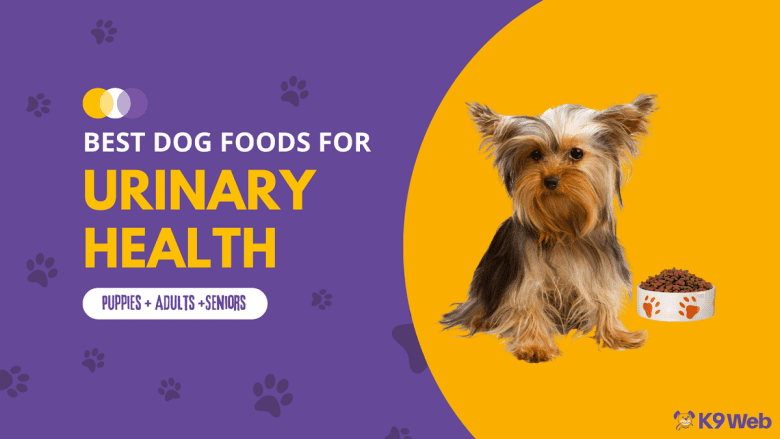
Urinary tract problems can be painful and possibly lead to more serious infections, like kidney infections and blockages of the urethra. Looking after your dogs urinary health is crucial as it affects their internal functions.
Some dogs such as Yorkshire Terriers, Shih Tzu, and Bichon Frise are more prone to urinary problems than others. These dogs may benefit from a specific diet formulated to support the urinary tract.
Luckily, there are a number of dog foods formulated just for dogs suffering from urinary health issues.
Check out our top picks of the best dog foods for puppies, adults, and seniors who tend to have more urinary problems.
Top 5 Picks for Best Dog Food for Urinary Health
Best Dog Food for Urinary Health (by Life Stage)
Feeding your pooch the right kind of dog food is extremely important, especially if you see any signs of urinary tract problems.
Good dog food for urinary health may have several things, including cranberries, extra cod oil, and even added vitamin B.
They should also be low in certain minerals, like magnesium and phosphorus. These ingredients may cause problems such as urolithiasis or bladder stones.
Best Dog Food for Puppies with Urinary Health Issues

Puppies are sometimes prone to urinary tract infections. Sometimes, this is due to their breed being more vulnerable to urinary tract problems.
If treated early, the pups urinary problems can be cleared up without difficulty. However, other dogs will need to continue with dog food made explicitly for urinary health issues.
1. Blue Buffalo Homestyle Recipe Puppy Chicken Dinner with Garden Vegetables Canned Dog Food
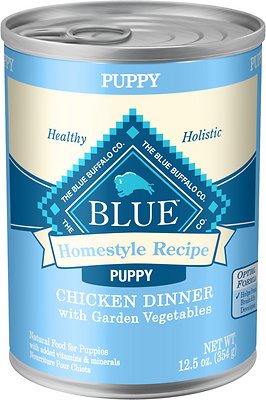
Our Rating: 4.8Top Ingredients: Chicken, Chicken Broth, Chicken LiverType: Wet
This wet dog food has more moisture than most, which can prevent dehydration. Hydration is essential to prevent urinary problems. It is also packed with omega fatty acids for healthy skin and coat.
This food is a suitable choice for many puppies as it contains quality ingredients your growing pup needs.
Pros:
- Made with real chicken
- Formulated with DHA
- Does not contain any by-product meals, corn, wheat, or soy
Cons:
- Contains peas, which the FDA is currently investigating due to its potential link to Canine Dilated Cardiomyopathy
CHECK PRICE HERE
Best Dog Food for Adult Dogs with Urinary Health Issues
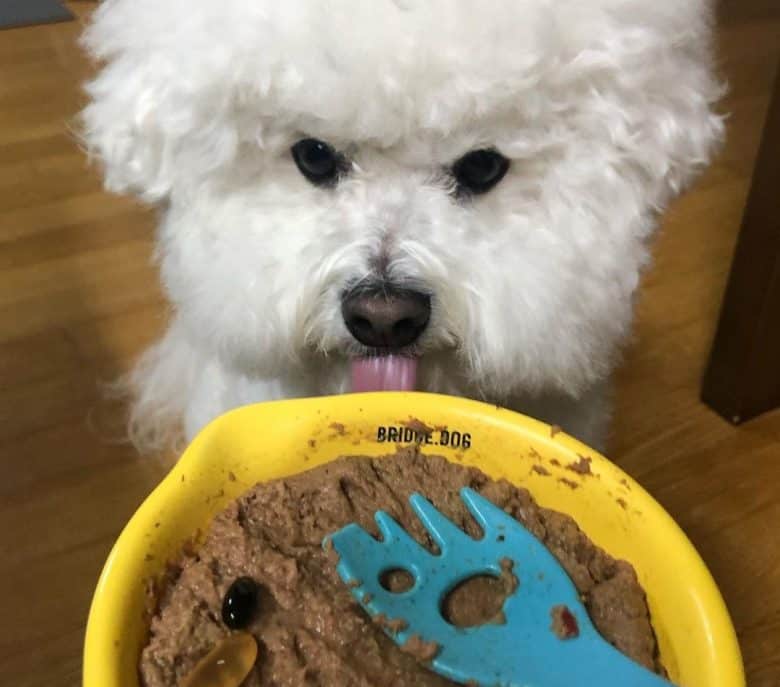
In this section, youll find various dog foods specifically designed for adult dogs with urinary added health problems.
2. Blue Buffalo Natural Veterinary Diet + Urinary Care for Dogs
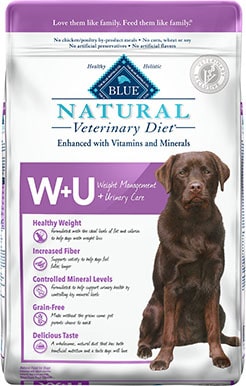
Our Rating: 4.5Top Ingredients: Deboned Chicken, Chicken Meal, Pea StarchType: Dry
This dry dog food is designed to support your dogs urinary health and help them maintain a healthy weight. It is made with dietary fiber to help your canine stay fuller for longer, and it is completely grain-free.
Pros:
- Veterinary diet formula
- Formulated with low levels of magnesium and sodium
- Contains no corn, wheat, or soy
Cons:
CHECK PRICE HERE
3. Purina Pro Plan Urinary Veterinary Diets Canned Dog Food
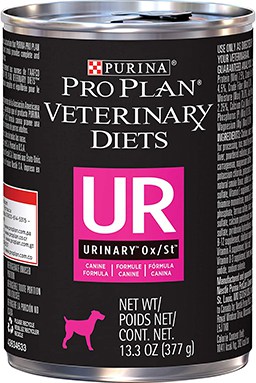
Our Rating: 4.5Top Ingredients: Chicken, water, riceType: Canned
This is another veterinary formula that is specifically formulated for urinary health. It is canned food with higher moisture content, making it perfect for canines with urinary problems.
Pros:
- Extra moisture
- Formulated to lower the risk of urinary stone formation
- Designed by vets
Cons:
- Includes meat by-products (aka mystery meat)
CHECK PRICE HERE
4. Royal Canin Veterinary Diet Urinary SO Small Breed
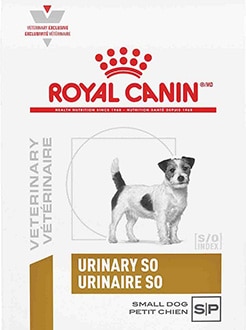
Our Rating: 4.7Top Ingredients: Brews Rice, Corn, Chicken FatType: Dry
This formula is designed to support the urinary tract and bladder in smaller dogs. It dilutes certain minerals to reduce the chance of stone and crystal formation. The kibble size is adapted for smaller dogs.
Pros:
- Lowers iron concentration in urine
- For dogs under 22 pounds
- Does not contain peas or any pea by-products
Cons:
- Not particularly high in meat ingredients
- Includes a variety of low-quality ingredients
CHECK PRICE HERE
5. Hills Prescription Diet C/D Urinary Care Multicare Chicken Flavor Wet Dog Food
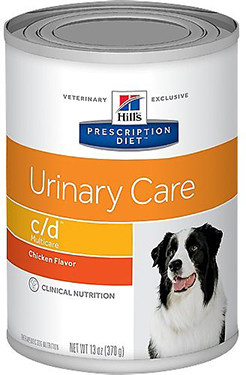
Our Rating: 5Top Ingredients: Water, Beef By-Products, ChickenType: Wet
This wet dog food is specifically designed to support your dogs bladder and urinary function.
It includes all the essential nutrients your canine needs without overloading the bladder and causing stones to develop.
Pros:
- Reduces the risk of calcium oxalate crystals and struvite crystals
- Formulated with controlled levels of magnesium, calcium, and phosphorus
- Includes extra antioxidants and omega fatty acids
Cons:
CHECK PRICE HERE
6. The Honest Kitchen Whole Grain Dehydrated Dog Food Chicken Recipe
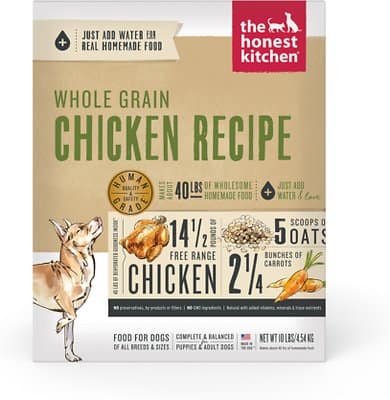
Our Rating: 4.6Top Ingredients: Dehydrated Chicken, Dehydrated Potatoes, Organic BarleyType: Dry
Sometimes, all a dog with urinary problems needs is high-quality dog food. Thats exactly what this food by The Honest Kitchen is.
It is made with free-range chicken and organic whole grain barley. This food is also non-prescription.
Pros:
- AAFCO compliant
- Made with minimal processing
- Contains no by-products, preservatives, or GMO ingredients
- Includes add moisture
Cons:
- Expensive
- Requires some preparation at home
CHECK PRICE HERE
7. Nulo Adult Trim Weight Management Dry Dog Food
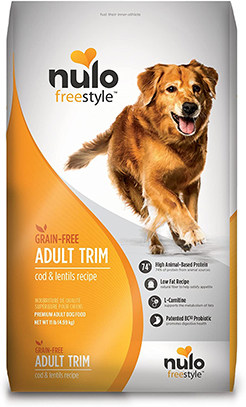
Our Rating: 4.5Top Ingredients: Deboned Cod, Turkey Meal, Salmon MealType: Dry
This dog food is made with plenty of meat products, including cod, turkey, and salmon.
It is free of corn, wheat, soy, and white potatoes. The blend is made with 74% animal-based protein, which is relatively high.
Pros:
- Designed to help manage weight
- Includes high-quality proteins
- Probiotics included
- L-Carnitine included boosting metabolism
Cons:
- Digestive problems have been reported
CHECK PRICE HERE
8. Hills Prescription Diet c/d Urinary Care Multicare Chicken Flavor Dry Dog Food
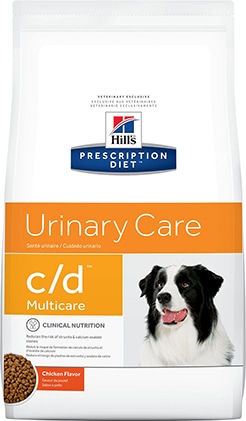
Our Rating: 4.8Top Ingredients: Whole Grain Corn, Chicken Meal, Pork FatType: Dry
This formula is designed specifically for dogs with urinary tract problems and bladder stones. It provides just the right amount of magnesium and phosphorus to prevent overloading the dogs system.
It is even enhanced with antioxidants to support your dogs immune system.
Pros:
- Balanced fat levels
- Low sodium content
- Includes omega-3 fatty acids
Cons:
CHECK PRICE HERE
9. Purina Pro Plan Veterinary Diets UR Urinary Ox/St Dry Dog Food
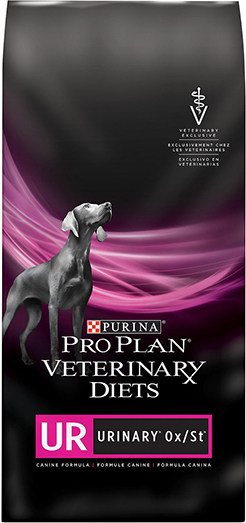
Our Rating: 4.5Top Ingredients: Brewers Rice, Whole Grain Corn, Chicken By-Product MealType: Dry
This food by Purina is explicitly designed to prevent painful urinary stones from forming.
It is intended for all life stages and can even dissolve current sterile struvite stones. Many dogs find that it is great-tasting, as well.
Pros:
- Specifically formulated to prevent urinary stones
- Includes antioxidants
- Dissolves current stones and prevents new ones
Cons:
CHECK PRICE HERE
Best Dog Food for Senior Dogs with Urinary Health Issues
Senior dogs are more prone to urinary health problems. Weve selected one dog food thats specifically formulated to support your dogs urinary tract.

10. Royal Canin Veterinary Diet Urinary SO Aging 7+ Canned Dog Food
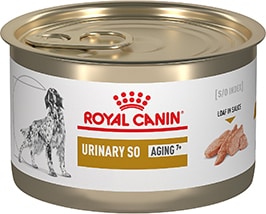
Our Rating: 4.5Top Ingredients: Water, Chicken, Chicken LiverType: Wet
For senior dogs, this dog food by Royal Canin is the best for urinary problems.
It is highly palatable and comes with water as the first ingredient to increase hydration. The included ingredients are also relatively high-quality.
Pros:
- Specially formulated for seniors
- Blend of antioxidants and nutrients to promote healthy cognitive function
- Can dissolve stones
Cons:
CHECK PRICE HERE
What are the common urinary health issues in dogs?

Dogs can potentially get several urinary health problems, just like people. Luckily, most of these problems are completely curable as long as help is sought.
However, in some cases, these problems can be deadly if left untreated. The problem itself usually isnt fatal, but infections can spread and cause other problems.
For this reason, it is essential to get your dog to the vet if you expect that they may be suffering from a urinary problem.
Infections in the Urinary Tract and Bladder
Urinary tract infections are quite common in some dogs. Symptoms include frequent urination, pain while urinating, blood in the urine, or straining to urinate.
Dogs that suddenly start going into the house may have a urinary tract infection.
A urinalysis typically diagnoses urinary tract infections. This is a breakdown of the contents of your pets urine ph. You will need to collect a urine sample.
However, even if a urinary tract infection can often be determined by a urinalysis, a culture and sensitivity test is sometimes necessary.
Several organisms can cause UTIs. Some only respond to certain antibiotics. Therefore, figuring out the bacteria causing the problem is important for treatment.
As we mentioned above, some dog breeds are prone to UTIs. Female dogs and those with diabetes mellitus are more likely to contract UTIs. Dogs that have bladder stones may be more susceptible to UTIs as well.
Formation of Stones and Crystals in the Bladder
Occasionally, stones and crystals can form in the bladder. These rock-like formations are made of minerals that have settled in the dogs bladder.
There can be a single, large stone or several smaller stones. Usually, a mixture of stones is present.
The clinical signs of stones include blood in the urine and straining while urinating. The condition is assumed to be painful, as people with bladder stones report pain.
Sometimes, these stones can cause an obstruction. This obstruction can be partial and will cause the dog to urinate more frequently.
Complete obstructions will eventually lead to the rupture of the bladder and are considered life-threatening.
No one knows exactly how bladder stones form, but there are many theories. Most of them are related to diet, so a change in your dogs diet is often recommended.
There are several minerals that dogs prone to kidney stones should keep at a minimum.
Usually, bladder stones can not be diagnosed based on clinical signs alone. Sometimes, bladder stones can be palpated with the fingers.
An x-ray is required to see the stones inside the bladder, though. One or more tests may be necessary to see the stones properly.
There are a few treatment options for bladder stones. One is surgical removal, which involves surgery to remove the stones.
The other option does not involve surgery. In addition, the stones can sometimes be dissolved using dietary changes alone.
Prevention is usually the best treatment in this case, though. Dog foods that are high in protein, magnesium, and phosphorus may contribute to bladder stones.
While all dogs need these minerals, those prone to bladder stones should consume them in smaller amounts.
Other Kidney and Bladder Issues

There are several other bladder and kidney problems as well, though these are usually rarer. Here is a list of other possible problems:
- Diabetes Mellitus
- Bladder Cancer or Tumors
- Cushings Disease
- Pyometra
- Prostatic Disease
- Kidney Stones
Weakness of Urethral Sphincter (Incontinence)
Incontinence is commonly a problem for older dogs. However, it can affect any dog at any age.
Incontinence has many different problems. Often, it is a symptom of an underlying disease.
UTIs, anatomic abnormalities, weak bladder, spinal injuries, and inherited medical conditions can all cause incontinence at any age. Prostate disorders, hormonal imbalance, and medications can also cause this problem.
Symptoms are usually pretty obvious; the most apparent sign is that your dog will have accidents.
However, if your canine was previously house trained and then starts having accidents, it could be a sign of a deeper problem.
Spayed female dogs may develop a specific type of incontinence called spay incontinence. It is caused by low estrogen levels, which eventually leads to muscle tone loss in the urethra.
Heres Dr. Lera discussing what urinary incontinence is and the tests your pup might need to determine if they have incontinence:
Urinary Tract Obstruction
Bladder stones usually cause urinary tract obstruction. These can go into the urethra and block the urine flow, which can be a serious problem.
If the blockage is complete, no urine will pass through the dogs system, and the bladder will eventually rupture.
Other things that somehow get stuck in your dogs urine can also create obstructions, though.
Kidney Disease or Failure
Kidney disease is often one of the most severe bladder problems out there. It involves the failure of the kidneys.
The kidneys are essential to your dogs body since they filter out wastes from the blood. So when they begin to fail, it can cause serious problems.
Causes of Urinary Tract Health Problems
Causes of urinary tract problems can vary widely from canine to canine. Some are born with anatomical differences that may put them more at risk for urinary problems.
Others may get exposed to bacteria that set up in their urinary tract, causing an infection. Spinal cord abnormalities and even stress can cause urinary tract health problems.
Diet may also play a role, especially in the formation of stones. High levels of certain minerals may play a role. Diets that are lower in these minerals may help prevent stones from forming.
Trauma to the urinary tract, bladder, or kidneys can also cause issues, such as obstructions. Congenital abnormalities can cause issues in puppies as they age.
Any disease that causes excessive drinking or little drinking can lead to other problems if left untreated.
Some dog breeds are particularly prone to urinary problems, including bulldogs.
Symptoms of a Urinary Tract Health Concern
The symptoms of most urinary tract problems are very similar. Therefore, it is difficult to tell them apart based on symptoms alone.
Often, UTIs are the most common, but all disorders will require further testing for confirmation.
Signs of Bladder Stones in Dogs

Bladder stones may not cause any symptoms at all until they get more serious. Often, you may not notice any symptoms until an obstruction occurs. Obstructions are severe and are considered life-threatening.
Here is a list of common symptoms:
- Trouble peeing
- Discolored urine
- Unable to control his bladder
- Blood urine
- Vomiting
Urinary Tract Infections Symptoms
UTIs may not have many symptoms either. If you notice any of these possible symptoms, it is important to get your dog checked.
The infection can spread to areas where it may be more serious, like the bladder. You may not see a long list of symptoms with a UTI.
Here is a list of UTI symptoms:
- Lethargy
- Foul Smell from Urine
- Persistent Licking of Genitals
- Lack of Appetite
- Urinating in inappropriate places
- Incontinence
What role does diet play in treatment?
Diet can play a significant role in managing urinary tract problems. Proper hydration is important to avoid things like UTIs and bladder stones. Wet food can improve a dogs hydration if they arent drinking enough otherwise.
The formulation of minerals also matters. Some have too high levels of certain minerals like phosphorus. Dogs who are prone to stones should consume lower levels of phosphorus in their diet.
Best Dog Food for Urinary Health Issues Buying Guide

Many urinary health issues can be prevented through proper diet. Stones are especially tied to diet, so canines prone to stones should consume a particular diet.
Dog Nutrition 101: What kind of food does your dog with urinary health issues need?
Puppies, adults, and seniors have specific health needs. For example, puppies often need more protein because they are growing.
However, the dietary guidelines for urinary health problems are the same for all life stages.
Things to look for when selecting food for Urinary Health: What should dogs eat?
Firstly, you should choose your food from a reliable brand. The ingredients should be high-quality and sourced from a suitable location.
Avoid foods formulated in China, for instance. The life stage should also be appropriate for your canine.
Even though youre looking for urinary health food, the ingredients should still be high-quality. Some brands may cut corners on the ingredients because its a specialty food.
Artificial preservatives, colors, and flavors should be avoided.
Balanced nutrition is essential, though lower protein is acceptable to avoid bladder stones. The protein included should be high-quality, though.
Omega-3 fatty acids are helpful for all canines and should be included. Preferably, the food should be high in moisture to increase hydration. Mineral levels like potassium should be limited to prevent buildup.
There arent any specific ingredients that should be avoided or included in urinary health dog food. Instead, the overall mineral and protein content is the most important thing to consider.
You should also consider the ion content and pH levels. Alkaline food may help prevent calcium oxalate stones and increase overall bladder health.
Limited ingredient and natural ingredient diets may be helpful, but they arent absolutely necessary.
Lower urinary tract diseases are usually caused by bacteria, which may not be affected by diet. Other urinary tract issues often are, though, in which case you will likely need to pick a prescription dog food.
Wet, Semi-Moist, or Dry? Which food is best for your dog?
For dogs prone to urinary problems, wet is the best option. This will increase water intake, which is important for dogs with nearly any urinary problem.
Dry can be suitable as well as long as your canine is drinking enough.
To grain or not to grain: Do dogs need grain-free food for Urinary Health issues?
There is no benefit to grain-free food for urinary health. Adding grains may help bring the protein level down to a suitable amount by increasing the carbohydrate amount.
However, high protein diets are not acceptable for most canines with urinary health problems.
Grain-free foods arent necessarily bad, though. Some have been connected to heart problems by the FDA, however.
Unless your dog is allergic to gluten, there isnt a particular reason to avoid it in pet food. Whole grains can be quite nutritional.
Can you give homemade food for your dog with Urinary Health issues?

Yes, but be sure you work with your vet to ensure that your dog is getting the appropriate amount of nutrients.
Heres one recipe for homemade dog food you can try:
Ingredients:
- Chicken legs and thighs
- Carrots
- Potatoes
- A cup of rice
- Two tbsp of olive oil
Instructions:
- Cook the rice according to package instructions
- Cut the carrots and potatoes into bite-size pieces
- Add the olive oil and cook the chicken and vegetables in the oven until tender
- Once the chicken has cooled, pick off the bones
- Mix all the ingredients in a bowl
You may serve right away, or you may put them in bags to freeze so you can serve them later.
Frequently Asked Questions (FAQs)

How to switch dog food without getting your pup sick
You should switch to dog food slowly. Start by adding only a tiny amount of the new dog food to your dogs current food. As they tolerate it, switch out more until they are completely on their new food.
Should you give dog chews for Urinary Health to your dog?
Yes, some chews are appropriate for dogs. Preferably, you want chews that are low in protein and phosphorus. Check the ingredient list and nutrition label. This often means resorting to dog treats like cookies and biscuits.
Can a dog pass bladder stones?
Some stones may be small enough for a dog to pass. These stones can be used to determine what the other stones are made out of, which may help with treatment options.
However, bigger stones cannot be passed and will need to be removed through other means.
What medicines can you give your dog for better urinary health?
Sadly, there arent many medications to help prevent most urinary problems. And before administering any medication, you need to check with your vet first.
Your vet may prescribe antibiotics for your pet if they already have UTI. However, diet and lifestyle changes are going to be the most important and practical.
Which supplements can you give to your dog for better urinary health?
There are many options on the market, many of which include cranberry.
Chewy and Amazon sell a number of supplements that you can buy. These supplements come in different forms like chewable, gels, tablets, and powders.
Speak with your vet about what may be the most helpful in your dogs specific situation.
Which food is best for Urinary Health?

The obvious winner is Hills Prescription Diet C/D Multicare Urinary Care Chicken Flavor Dog Food if you have an adult canine.
This food is wet, so it includes higher levels of moisture than other diets. It also has decreased levels of certain minerals, which can help with stone prevention.
There are other dog foods that are great for your pups urinary health but did not make it to our list.
You can check out Wellness CORE Grain-Free Puppy Recipe, FirstMate LID Australian Lamb Meal Formula, and American Journey Salmon & Sweet Potato Recipe, which are good recipes for dog foods for urinary health.
Its important to consult your vet first if youre changing your pups food, especially if he has urinary health concerns.
Has your dog tried any of the foods we mentioned? Leave a comment below; wed love to know more about it.
Reference
Cess Gamas( Head of Content Marketing and Editor )Cess is the Head of Content Writing at K9 Web and a passionate dog care expert with over 5 years of experience in the Pet Industry. With a background in animal science, dog training, and behavior consulting, her hands-on experience and extensive knowledge make her a trusted source for dog owners.
When not writing or leading the K9 Web content team, Cess can be found volunteering at local shelters and participating in dog-related events.

